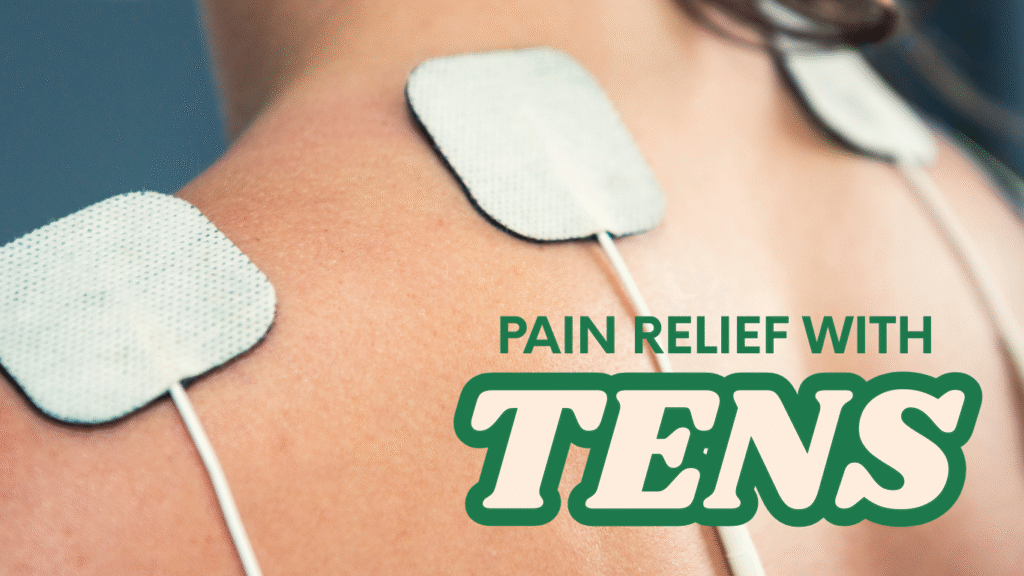As a physiotherapist who’s worked with 100’s of patients over the past decade, I’m often asked about TENS units. These small devices have become incredibly popular for managing pain at home, but there’s still a lot of confusion about when they’re most helpful. More importantly, research from Cochrane Reviews, the gold standard of medical evidence, has given us clearer insights into when TENS units truly work and when they don’t.

What exactly is a TENS unit?
TENS stands for Transcutaneous Electrical Nerve Stimulation. But don’t let the fancy name put you off. Simply put, it’s a small, battery-powered device that sends gentle electrical pulses through your skin to help reduce pain. You attach sticky electrode pads to your skin, and the unit delivers mild electrical currents that feel like a tingling or buzzing sensation.
A brief history:
Modern TENS technology developed from the “gate control theory” of pain discovered in the 1960s by researchers Melzack and Wall. They found that stimulating certain nerve fibers could essentially “close the gate” on pain signals traveling to the brain. By the 1970s, the first portable TENS units were being used in hospitals, and they’ve been improving ever since.
What the latest research tells us:
Here’s where things get interesting and perhaps a bit disappointing for TENS enthusiasts. Recent reviews by Cochrane, which analyzed dozens of studies involving thousands of patients, have revealed important truths about TENS effectiveness.
The methodological quality of TENS reviews was good, but the quality of evidence within them was very low, making it impossible to conclude with confidence that TENS is beneficial for pain control in people with chronic pain. This doesn’t mean TENS doesn’t work, it means we need better research to prove it definitively.
However, the research isn’t entirely discouraging. For rheumatoid arthritis, Cochrane reviews found that acupuncture-like TENS) helps decrease pain and joint tenderness related to hand rheumatoid arthritis compared to placebo.
What TENS units are great for:
Despite the mixed research findings, TENS units can be particularly helpful as part of a broader pain management strategy rather than a standalone treatment.
The beauty of TENS units is that they’re drug-free, have virtually no side effects when used correctly, and give you control over your pain management. Studies show that TENS can help restore central pain modulation, suggesting it may work by affecting how your nervous system processes pain signals.
What TENS units aren’t so good for:
Conditions I don’t typically recommend TENS for include
- Severe, acute injuries that need immediate medical attention
- Deep tissue problems like disc herniations or major joint issues
- Nerve pain conditions like sciatica, where results are often inconsistent
Understanding the research limitations:
It’s important to understand why the research on TENS is challenging. Published trials don’t provide clear information on which stimulation parameters are most likely to provide optimum pain relief, nor do they answer questions about long-term effectiveness. This means that while TENS may work for many people, we’re still learning about the best ways to use these devices.
Getting the most from your TENS unit:
If you’re considering a TENS unit, remember that finding the right settings takes experimentation. Start with lower intensities and adjust gradually. The sensation should be comfortable and never painful. Most people find sessions of 20-30 minutes most effective.
Quality matters too. Look for units with multiple programs and adjustable intensity levels. The cheapest option isn’t always the best value.
Consider TENS as one tool in your pain management toolkit rather than a magic solution. It works best when combined with other approaches like exercise, proper posture, stress management, and when appropriate, professional physiotherapy treatment.
The bottom line:
The honest truth about TENS units is that the research is still catching up with clinical practice. While large-scale studies haven’t definitively proven their effectiveness for all types of pain, they remain a safe, non-invasive option that many patients find helpful.
For people with chronic pain, current research makes it difficult to confidently state whether TENS is effective compared to other care. However, this doesn’t mean they’re useless. It means we need better studies and more personalised approaches to determine who benefits most.
Remember, persistent pain should always be evaluated by a healthcare professional. TENS units work best as part of a comprehensive approach to managing your condition, not as a standalone cure-all.